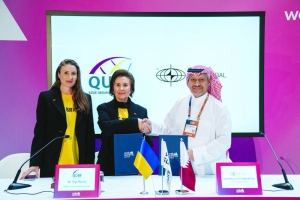Qatar launches ‘Digital Skills Framework’ initiative to accelerate digital transformation

This national initiative is intended to empower both individuals and organizations with critical digital skills
Qatar’s Ministry of Communications and Information Technology (MCIT) has introduced the Digital Skills Framework as the inaugural executive initiative of the “Digital Skills Working Group.” In a statement, the MCIT emphasized that this national initiative is intended to empower both individuals and organizations with critical digital skills to facilitate Qatar’s digital transformation. Constructed upon global best practices, the framework guarantees alignment with the shifting needs of the labor market and the most recent advancements in digital technology, QNA reported.
Framework aligns with Digital Agenda 2030
The framework also corresponds with the sixth pillar of the Digital Agenda 2030, titled “Future Leading Digital Society.” This launch follows the establishment of the Digital Skills Working Group, which MCIT unveiled at the end of the previous year. The working group is committed to enhancing digital skills within government entities, crafting innovative training programs, and coordinating efforts among stakeholders to create a nurturing environment for digital learning and professional advancement.
Key tool for developing a skilled workforce
The Digital Skills Framework will act as a vital tool in cultivating and preparing a proficient national workforce capable of addressing the requirements of a swiftly evolving digital job market. By providing a transparent structure for assessing and enhancing skills, it enables both individuals and organizations to adapt successfully to the rapid digital transformation.
The framework encompasses 19 key digital skill domains, which cover a wide array of essential competencies required across both public and private sectors in Qatar. It identifies 115 digital skills, classified into four progressive proficiency levels, ensuring a thorough approach to digital upskilling.
Read more: Qatar’s digital investments expected to reach $5.7 billion: Report
Stages of digital empowerment
Under the framework’s regulatory policies, individuals advance through four integrated stages of digital empowerment. The first stage, Awareness, involves acquiring fundamental knowledge of digital skills. This is succeeded by Knowledge, where individuals deepen their comprehension of digital tools and technologies. In the Ability stage, they cultivate practical skills to effectively implement their digital knowledge in the workplace. Lastly, at the Transformation stage, individuals utilize digital technologies to foster innovation and drive digital transformation, thereby enhancing digital efficiency across various sectors.
Benefits for individuals and organizations
The Digital Skills Framework provides numerous advantages, allowing individuals to evaluate their digital competencies, pinpoint areas for enhancement, and monitor their progress. Additionally, it assists organizations in defining the digital skills necessary in the labor market, facilitating the development of human capital strategies and guiding recruitment processes in alignment with national and sectoral demands.
Moreover, individuals and organizations can access the Digital Skills Framework and its resources by reaching out to the Digital Skills Working Group team via email at dsf@mcit.gov.qa. MCIT further encourages all stakeholders to delve into the framework and urges organizations to integrate it into their workforce development initiatives.
Related
QUBF launches ‘Qatar-Ukraine Tech and Innovation Committee’
Dr Olga Revina, chairperson of QUBF, and Sheikh Mansoor bin Khalifa al-Thani, fou
Initiative to support digital innovation in Qatar launched
Assistant Undersecretary for Digital Industry Affairs at MCIT Reem Al Mansoori, and General Manager of Microsoft Qatar Lana Khalaf exchanging documents after s
MCIT, Microsoft Sign Partnership Initiative to Support Digital Innovation and…
As part of its efforts to enhance digital innovation and support the growth of startups in the country, the Ministry of Communications and Information Technolog
IIA Qatar hosts session on tech-driven transformation in internal audit
Officials pose during the seminar hosted by Institute of Internal Auditor Qatar Chapter. Doha, Qatar: The Institute of Internal Auditor Qatar Chapter r












